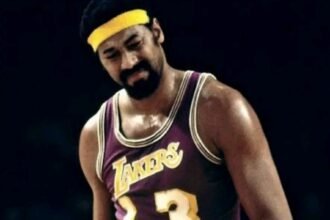Wilt Chamberlain, one of the most dominant figures in NBA history, was known for his record-breaking performances and unparalleled athleticism. While he played in an era where he towered over most of his competition, his influence on the game continues to spark debates about who deserves the title of the greatest player in NBA history. If Chamberlain were to explain who the number one player in the NBA is, he would likely approach the topic from a unique perspective, drawing on his personal experiences, statistical achievements, and understanding of the game’s evolution.
Chamberlain, with his reputation for both confidence and controversy, would not shy away from stating his opinion on the matter. He was often outspoken about how his own dominance was underappreciated compared to later players, and he might begin his explanation by questioning the criteria used to determine the best player. Is it purely about statistics? Championships? Impact on the game? Longevity? Athletic ability? All these factors come into play when discussing the best player of all time, and Chamberlain would likely break down each one to justify his choice.
Statistically speaking, Wilt Chamberlain’s records still stand as some of the most untouchable in basketball history. He famously scored 100 points in a single game, averaged over 50 points per game for an entire season, and retired with over 30,000 points and 20,000 rebounds. If his choice for the best player were purely based on numbers, he might argue that he himself holds that title. However, Chamberlain was also a realist and understood that the game evolved past his era. He often acknowledged the skills and achievements of players who came after him, particularly those who brought new elements to the game that were not as prominent during his time.
If Chamberlain were assessing the modern era, he might look at players who have not only excelled statistically but also dominated their respective eras in ways reminiscent of his own time. Michael Jordan is often regarded as the greatest of all time, and Chamberlain acknowledged Jordan’s greatness during interviews later in his life. He respected Jordan’s ability to dominate on both ends of the floor and his unmatched competitive drive. However, Chamberlain, known for his strong opinions, also pointed out that Jordan played in an era that had rules more favorable to perimeter players compared to the physicality of Chamberlain’s era. He might argue that Jordan, while an incredible talent, benefited from rule changes that allowed guards to thrive more than they did in the 1960s and 1970s.
LeBron James would also be a strong contender in Chamberlain’s analysis. LeBron’s combination of size, skill, and longevity is something that Chamberlain would appreciate. At 6’9” and 250 pounds, LeBron possesses a rare mix of power and agility that allows him to dominate in multiple facets of the game. Chamberlain, who prided himself on being an all-around athlete, would likely respect LeBron’s versatility and ability to impact the game as a scorer, passer, and defender. However, Chamberlain was also a fierce competitor who placed great value on winning championships. While LeBron has won multiple titles, Chamberlain might compare his championship count to that of other legends like Bill Russell, whose 11 rings set a standard for winning.
Speaking of Bill Russell, Chamberlain had a long-standing rivalry with him, and if he were to explain who the number one NBA player is, he might bring up the importance of leadership and team success. Russell was never the most dominant scorer, but he was an unparalleled winner, consistently leading his team to championships. Chamberlain, despite his superior individual numbers, often lost to Russell in the playoffs. If he were to emphasize winning as the most important factor, he might lean towards a player who, like Russell, elevated his team to constant championship success.
Kareem Abdul-Jabbar is another player Chamberlain would consider in his explanation. Kareem, who surpassed Chamberlain’s all-time scoring record, had one of the longest and most successful careers in NBA history. His signature skyhook shot was nearly unstoppable, and he won six championships while maintaining elite production for two decades. Chamberlain, who played against Kareem early in his career, respected his talent but might argue that Kareem had the benefit of playing in a more team-oriented system that allowed him to thrive.
If Chamberlain were to address today’s game, he might also mention players like Kevin Durant, who combines size and shooting ability in a way that was unheard of in his era, or Stephen Curry, whose three-point revolution changed the game’s dynamics. However, Chamberlain often focused on physical dominance, and while Curry’s impact is undeniable, he might not see him as the best overall player compared to those who could dominate inside the paint and control the game physically.
Ultimately, if Chamberlain were to definitively name the number one NBA player, his decision would likely come down to two players: himself and Michael Jordan. Chamberlain always believed in his own greatness and often felt that he did not receive enough credit for what he accomplished. He might argue that he played in a tougher, more physical era and put up numbers that no one has since matched. At the same time, he respected Jordan’s ability to dominate his era and win at the highest level. If he had to choose, he might say something like, “If you’re talking about pure dominance, there’s no one like me. But if you want the greatest winner and competitor, Jordan’s your guy.”
His explanation would be filled with historical context, comparisons to different eras, and a deep analysis of what makes a player truly great. He would acknowledge the greatness of others while making a strong case for himself. Chamberlain’s legacy is one of unbreakable records and awe-inspiring performances, and whether or not he names himself the greatest, his argument would always highlight the undeniable impact he had on the game of basketball.





